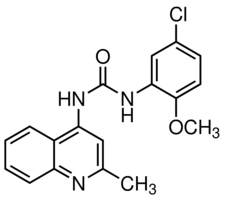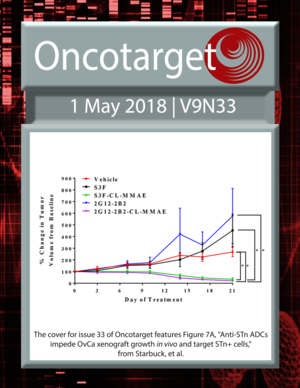All AbMole products are for research use only, cannot be used for human consumption.

PQ401 is an IGF-1R inhibitor. PQ401 inhibits breast cancer cell growth in culture and in vivo. PQ401 inhibited autophosphorylation of the IGF-IR in cultured human MCF-7 cells with an IC50 of 12 micromol/L and autophosphorylation of the isolated kinase domain of the IGF-IR with an IC50 <1 micromol/L. In addition, PQ401 inhibited the growth of cultured breast cancer cells in serum at 10 micromol/L. PQ401 was even more effective at inhibiting IGF-I-stimulated growth of MCF-7 cells (IC50, 6 micromol/L). Treatment of MCF-7 cells with PQ401 was associated with a decrease in IGF-I-mediated signaling through the Akt antiapoptotic pathway. Twenty-four hours of treatment with 15 micromol/L PQ401 induced caspase-mediated apoptosis. In vivo, treatment with PQ401 (i.p. injection thrice a week) reduced the growth rate of MCNeuA cells implanted into mice. The IGF-1R tyrosine kinase inhibitor PQ401 inhibited growth of SCC-25 and Cal27 cells alone and also acted synergistically with gefitinib.

Oncotarget. 2017 Dec 28;9(12):10375-10387.
The crosstalk between breast carcinoma-associated fibroblasts and cancer cells promotes RhoA-dependent invasion via IGF-1 and PAI-1
PQ401 purchased from AbMole
| Cell Experiment | |
|---|---|
| Cell lines | MCF-7 cells |
| Preparation method | Effects of Diaryl Urea on IGF-I Stimulated Proliferation of Breast Cancer Cells MCF-7 cells were harvested by washing thrice with PBS and dissociating with 1 mL 0.05% trypsin. Cells were resuspended in 5 mL defined medium (1:1 Ham's F12/DMEM 4.5 g/L glucose; 1 mg/mL bovine serum albumin; 10 μg/mL transferrin; 15 mmol/L HEPES pH 7.2; 2 mmol/L L-glutamine; 100 units/mL penicillin G; 100 μg/mL streptomycin SO4; 2.5 μg/mL fungizone) containing 200 μg soybean trypsin inhibitor. Cells were plated in 96-well collagen-coated plates at a density of 5,000 per well in 100-μL medium. Twenty hours later, defined medium with or without IGF-I (10 nmol/L) was added. Four hours later, PQ401 diluted in defined medium was added. Plates were harvested on day 3, as described above, for determination of cell number by CyQuant assay. |
| Concentrations | 0, 2.5, 5, 7.5, 15, 30µM |
| Incubation time | 3 days |
| Animal Experiment | |
|---|---|
| Animal models | MCNeuA tumor cells bearing mice model |
| Formulation | 8% polysorbate 80/ethanol/PBS |
| Dosages | 50 or 100 mg/kg |
| Administration | i.p. thrice a week |
| Molecular Weight | 341.79 |
| Formula | C18H16ClN3O2 |
| CAS Number | 196868-63-0 |
| Solubility (25°C) | DMSO 14 mg/mL |
| Storage |
Powder -20°C 3 years ; 4°C 2 years In solvent -80°C 6 months ; -20°C 1 month |
| Related IGF-1R Products |
|---|
| Indirubin Derivative E804
Indirubin Derivative E804 is a potent inhibitor of Insulin-like Growth Factor 1 Receptor (IGF1R), with an IC50 of 0.65 μM for IGF1R. |
| IGF-I (24-41)
IGF-I (24-41) (Insulin-like Growth Factor I (24-41)) is amino acids 24 to 41 fragment of IGF-I. |
| GIP, human
GIP, human is a peptide hormone consisting of 42 amino acids that also acts as a promoter of glucose-dependent insulin secretion and a weak inhibitor of gastric acid secretion. In addition, GIP, human acts as an enteric proinsulin hormone released by intestinal K cells in response to nutrient intake. |
| VMB-100
VMB-100 is an engineered mRNA molecule encoding human insulin-like growth factor-1 (IGF-1) that induces IGF-1 expression in human muscle cells. |
| NBI-31772 hydrate
NBI-31772 hydrate is a potent inhibitor of interaction between insulin-like growth factor (IGF) and IGF-binding proteins (IGFBPs). NBI-31772 hydrate is also a nonpeptide ligand that releases bioactive IGF-I from the IGF-I/IGFBP-3 complex (Kis=1-24 nM for all six human subtypes). Anxiolytic and antidepressant-like effects. |
All AbMole products are for research use only, cannot be used for human consumption or veterinary use. We do not provide products or services to individuals. Please comply with the intended use and do not use AbMole products for any other purpose.


Products are for research use only. Not for human use. We do not sell to patients.
© Copyright 2010-2024 AbMole BioScience. All Rights Reserved.
